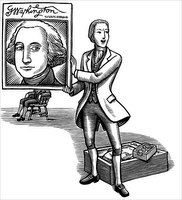On the 4th of July

Francois Furstenberg teaches history at the University of Montreal. He is the author of In the Name of the Father: Washington's Legacy, Slavery and the Making of a Nation. His article in the NYT of July 4th is related to the world of the Founding Fathers - and he looks beyond the great figures of Franklin, Washington, Adams, Jefferson, Madison, to find there Mason Locke Weems (author, clergyman, book peddler, not a great man, perhaps, but a maker of great men; not counted among the popular sages, but certainly among those who made them popular), or Mathew Carey (his efforts to encourage nationalism through popular literature earned him praise from some of the most eminent figures of the era, including Washington), or Caleb Bingham (printer, schoolteacher and bookseller: wrote some of the most popular schoolbooks of the era — works that would teach American children to exalt liberty, the nation, and the values of their founders). His article speaks then about Noah Webster, the founder's founder: his texts would teach Americans not just to spell and indeed to think, but to do both as Americans.
Here is Prof. Furstenberg's article (Spinning the Revolution).
There is another article in the NYT of July 4th that I'd like to talk about. The author is John Tierney and the title can sound provocative (Disunited States of America). What if the outcome of the civil war were a bit different? The Southern States would have remained an independent Confederation - it's an hypothesis analyzed by some books. The one authored by Roger L. Ransom (The Confederate States of America: What Might Have Been) gives a pessimistic scenario: South and North remain two hostile entities, the South renounces to slavery in the 1870's, due to the decline of cotton price, but the black people remain without civil rights and try to run to the North, only the North strengthens its borders. This vision is shared by John Majewsky, who believes both North and South would have become pourer. The optimistic scenario is given by Jeff Hummel (Emancipating Slaves, Enslaving Free Men): both North and South would become more prosperous: slavery would have collapsed quickly if the South had been allowed to peacefully secede and the North had simply stopped returning runaway slaves. Unable to stop slaves from escaping the South would have been forced to abandon the system, and freed blacks could ultimately have been better off than they were during the Jim Crow era.
Pessimistic or optimistic, all authors seem to agree that slavery would not have survived the 1870’s, due to the decrease of cotton price. So the South should have to reinvent itself. And actually it did, only a hundred years later, when the Dixiecrats became Republicans, and the Bible Belt became also the economically powerful Sun Belt.
I would add to these books another one, by Harry Turtledove, The Disunited States of America - only this belongs to the SF genre: time travel doesn't work. You can't go backward or forward; you're stuck at "now". What you can do is travel sideways, to the same "now" in another timeline where history turned out differently. So far, only our home timeline has figured out how to do that. We use Crosstime Traffic to conduct discreet trading operations in less advanced timelines, selling goods just a little bit better than the locals can make. It's profitable, but families who work as Time Traders have to be careful to fit in, lest the locals become suspicious ...
0 Comments:
Post a Comment
<< Home